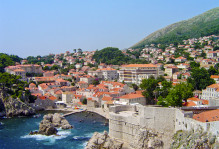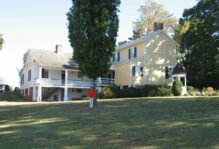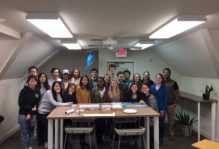DC Center Winter Seminar Gives Students First-Hand Look at Urban Education
This winter, 26 six students started off their spring semester exploring the many complicated aspects of urban education. As part of the 2019 William & Mary D.C. Winter Seminar at the W&M Washington Center, the students enrolled in a seminar together. The three-credit course, Urban Education: Policy, Practice, and Leadership, provided students with an intensive and hands-on introduction to the topic of urban education.
Included in this exploration of schooling in the United States are varying conceptions on the purposes of education and public schools. Particular attention is given to issues of inequality, including its causes and strategies to mitigate it. Students in this course will examine a variety of topics, such as, the cultural and political characteristics of schools, school reform, the role of schools in a democratic society, race and racism, gender, class, social justice, educational equity, diversity, and teacher pedagogy.
“I could not think of a better way to start my last semester at William & Mary,” says Hope Duke ’19. “Having the chance to live with classmates and focus on this one course allowed me to totally immerse myself in the material and have in-depth conversations with classmates who shared an interest in the topic.”
Through the seminar, students connect with one another around a common interest and are able to foster the W&M sense of community away from campus while living together. The course was co-taught by Drew Stelljes, assistant vice president for student engagement and leadership and executive assistant professor and Krista Schroth, a graduate assistant and former high school teacher. Students tackled questions of inequality and ambiguity and learned through class sessions, panel discussions, site visits, and meetings with policymakers.
The classroom experience was complemented by numerous field visits to relevant educational models. The class visited the headquarters for KIPP charter schools, Sidwell Friends School, public elementary schools, and other schools. They asked the same six questions at each site visit, which Duke says allowed them to “better compare how people view the education system.”
Included the the class was the examination of:
- Influence of current political, social and cultural norms on educational priorities, curriculum and instruction on urban schools,
- Impact of increased emigration / immigration to urban areas and urban school systems
- Consideration of our ability to understand diverse cultures, while acknowledging our own preconceptions and biases as a product of our own lived experiences and
- Consideration and articulation of the confluence of race, gender, class, ethnicity, sexual orientation, culture, and religion on educational attainment in urban schools.
Alexander Brinkley ‘19 shared that the course provided valuable takeaways like the importance of expanding his own understanding of an issue. “There are always more valuable perspectives to understand than may be apparent at first, second, or even third pass,” Brinkley said.
Brinkley also raved about his classmates, noting that they were “fantastic human beings with a desire to grow and learn. Each student contributed to the class in unique and valuable ways, creating a culture that was primed to gain as much as possible from each experience.” The amazing students, coupled with exemplary leadership from Drew and Krista, made the program an indispensable tool for students to carry with them throughout their studies at W&M and beyond, Brinkley added.
Brinkley added that no matter what specific paths the students choose in the future, the skills and insights gained from the Urban Education course are indispensable and will help drive them to be better leaders, listeners, and educators.




No comments.
Comments are currently closed. Comments are closed on all posts older than one year, and for those in our archive.